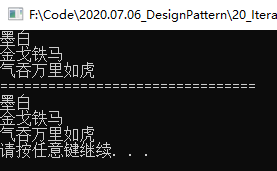1、什么是迭代器模式?
1、迭代器模式(Iterator),提供了一种顺序访问一个聚合对象中各个元素,而又不保留该对象的内部表示的方法。
2、简单来说,迭代器模式,分离了集合对象的遍历行为,抽象出一个迭代器类来负责,这样既可以做到不暴露集合的内部结构,又可让外部代码透明地党文集合内部的数据。
3、类似于 foreach in ,不需要知道集合对象是什么,就可以遍历所有对象的循环工具。
2、迭代器模式的适用场景?
1、当需要访问一个聚集对象,且,不管这些对象是什么,都需要遍历的时候,应该考虑迭代器模式。
2、需要对聚集对象有多种方式遍历时,可以考虑迭代器模式。
3、使用现状:
迭代器模式在访问数据、集合、列表等数据时,尤其是数据库操作时,是非常普遍的引用,但由于它太普通了,所以各种高级语言都对它进行了封装,故,反而给人感觉迭代器模式本身不太常用了。
3、怎样使用迭代器模式?

4、实例
1、Iterator.h
#pragma once
#include <string>
class Iterator
{
public:
virtual std::string first() = 0;
virtual std::string next() = 0;
virtual bool isDone() = 0;
virtual std::string currentItem() = 0;
};
2、Aggregate.h
#pragma once
#include <string>
#include "Iterator.h"
class Aggregate
{
public:
virtual int count() = 0;
virtual void push(const std::string& strValue) = 0;
virtual std::string operator[](int nIndex) = 0;
virtual Iterator* createIterator() = 0;
};
3、ConcreteIterator.h
#pragma once
#include "Iterator.h"
#include "Aggregate.h"
class ConcreteIterator :
public Iterator
{
public:
ConcreteIterator(Aggregate* pAggregate);
std::string first();
std::string next();
bool isDone();
std::string currentItem();
private:
Aggregate* m_pAggregate{ nullptr };
int m_nCurrent{ 0 };
};
ConcreteIterator::ConcreteIterator(Aggregate* pAggregate)
:Iterator(), m_pAggregate(pAggregate)
{
}
std::string ConcreteIterator::first()
{
return (*m_pAggregate)[0];
}
std::string ConcreteIterator::next()
{
std::string strRet;
m_nCurrent++;
if (m_nCurrent < m_pAggregate->count())
{
strRet = (*m_pAggregate)[m_nCurrent];
}
return strRet;
}
bool ConcreteIterator::isDone()
{
return (m_nCurrent >= m_pAggregate->count()) ? true : false;
}
std::string ConcreteIterator::currentItem()
{
return (*m_pAggregate)[m_nCurrent];
}
4、ConcreteAggregate.h
#pragma once
#include "Aggregate.h"
#include "ConcreteIterator.h"
#include <vector>
class ConcreteAggregate :
public Aggregate
{
public:
~ConcreteAggregate();
int count() override;
void push(const std::string& strValue)override;
//重载下标运算符,只重载了取值功能
std::string operator[](int nIndex);
Iterator* createIterator();
private:
std::vector<std::string> m_vecItems;
Iterator* m_pIterator{ nullptr };
};
ConcreteAggregate::~ConcreteAggregate()
{
if (nullptr != m_pIterator)
{
delete m_pIterator;
m_pIterator = nullptr;
}
}
int ConcreteAggregate::count()
{
return m_vecItems.size();
}
void ConcreteAggregate::push(const std::string& strValue)
{
m_vecItems.push_back(strValue);
}
//下标运算符感觉只重载了一半,其他参考函数都是返回引用,我这边返回引用会崩溃,不知道什么原因?
std::string ConcreteAggregate::operator[](int nIndex)
{
std::string strRet;
if (nIndex < count())
{
strRet = m_vecItems[nIndex];
}
return strRet;
}
Iterator* ConcreteAggregate::createIterator()
{
if (nullptr == m_pIterator)
{
m_pIterator = new ConcreteIterator(this);
}
return m_pIterator;
}
5、测试程序
#include "iterator.h"
#include "ConcreteAggregate.h"
#include <iostream>
void test()
{
ConcreteAggregate* pName = new ConcreteAggregate();
if (nullptr != pName)
{
pName->push("墨白");
pName->push("金戈铁马");
pName->push("气吞万里如虎");
}
Iterator* iter = pName->createIterator();
if (nullptr != iter)
{
std::string strItem = iter->first();
while (!iter->isDone())
{
std::cout << iter->currentItem() << std::endl;
iter->next();
}
}
std::cout << "================================" << std::endl;
for (int i = 0; i < pName->count(); ++i)
{
std::cout << (*pName)[i] << std::endl;
}
}
int main()
{
test();
system("pause");
return 0;
}

注:代码有借鉴:c++ 迭代器模式(iterator) ,做了一些更改,去掉了pop函数,增加了下标运算符[]重载。
此为《大话设计模式》学习心得系列 P202~~






















 631
631











 被折叠的 条评论
为什么被折叠?
被折叠的 条评论
为什么被折叠?








